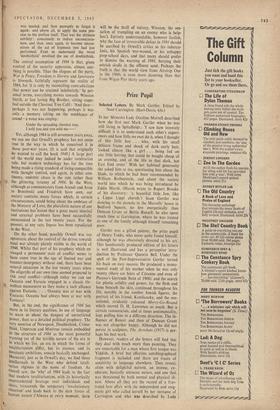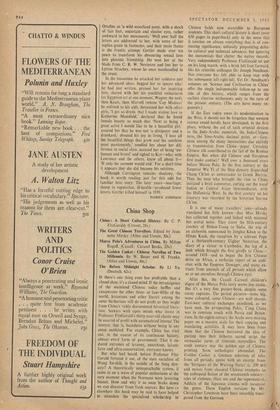Prize Pupil
Selected Letters. By Mark Gertler. Edited by Noel Carrington. (Hart-Davis, 63s.)
IN her Memoirs Lady Ottoline Morrell described how she first met Mark Gertler when he was still living in Spitalfields: 'I saw how intensely difficult it is to understand each other's experi- ences.and how little we ever do it, when I thought of this little boy . . . who, with his small delicate frame and shock of dark curly hair, looked almost like a girl . . . being fed on any little herring that could be bought cheap of an evening, and of the life in that dark, hot East End street.' With her habitual generosity she asked him to tea, questioning him about the Slade, to which he had been recommended by William Rothenstein, and about the society world into which he was being introduced by Eddie Marsh. (Marsh wrote to Rupert Brooke of his discovery: 'a beautiful little Jew, like a Lippo Lippi cherub.') Soon Gertler was dancing to the pianola in the Morrells' house in Bedford Square, no less energetically than Duncan Grant or Bertie Russell; he also spent much time at Garsington, where he was treated as one of the family although himself remaining poor.
Gertler was a gifted painter, the prize pupil of Henry Tonks, who never quite found himself, although he was obsessively devoted to his art. This handsomely produced edition of his letters is well illustrated and has a perceptive intro- duction by Professor Quentin Bell. Under the spell of the Post-Impressionists Gertler turned his back on easy success. He produced a monu- mental study of his mother when he was only twenty (there are hints of Cezanne and even of Picasso's Gertrude Stein of 1906); and the search for plastic solidity and power, for the flesh and bone beneath the skin, continued throughout his life, notably in the sombre Jewish figures, the portrait of his friend, Koteliansky, and the sen- sational, stridently coloured Merry-Go-Round which moved D. H. Lawrence so much. But a certain romanticism, and at times sentimentality, kept pulling him in a different direction. The in- fluence of Renoir and then of Duncan Grant was not altogether happy. Although he did not persist in sculpture, The Acrobats (1917) is per- haps his best work.
However, readers of the letters will find that they deal with much more than painting. They are remarkable for a man whose first tongue was Yiddish. A brief but effective autobiographical fragment is included and there are traces of sensitivity to language elsewhere. They reveal, often with delightful naiveté, an intense, ex- uberant, basically sensuous nature, and one that was threatened by both mental and physical ill- ness. Above all they are the record of a frus- trated love affair with the independent and enig- matic girl who called herself by her surname of Carrington and who was described by Lady
Ottoline as 'a wild moorland pony, with a shock of fair hair, uncertain and elusive eyes, rather awkward in her movements.' Well over half the letters are addressed to her, with some of her replies given in footnotes, and their main theme is the frantic attempt Gertler made over ten years to transform his devouring sexual love into platonic friendship. He won her at the Slade from C. R. W. Nevinson and lost her to Lytton Strachey, whom he once manhandled in the street.
In the meantime he attacked her coldness and her advanced ideas, begged her to ignore what he had just written, praised her for inspiring him, shared with her his youthful enthusiasm for Egyptian art at one moment, Wagner the next, then Keats, then Marvell (whose 'Coy Mistress' he enlisted to his aid), threatened her with other girls, 'I got so drunk that I made violent love to Katherine Mansfield,' declared that he loved female beauty so much that 'Next to being a great artist I would like to be a beautiful girl,' assured her that he was not 'a dissipator and a drunkard,' shouted his joy in, living, 'I love all the beautiful things that grow and the sunshine most passionately,' needled her about her dif- ference in social class, accused her of being 'un- human and brutal' and sighed to Kot—who, with Lawrence and the others, knew all about it— 'If only the torment would end.' For a short time it appears that she did become his mistress.
Although Carrington remains shadowy, the book is worth reading just for this odd but familiar love story. The later years—marriage, slump in reputation, ill-health--produced fewer letters. Gertler killed himself in 1939.
PATRICK ANDERSON







































 Previous page
Previous page